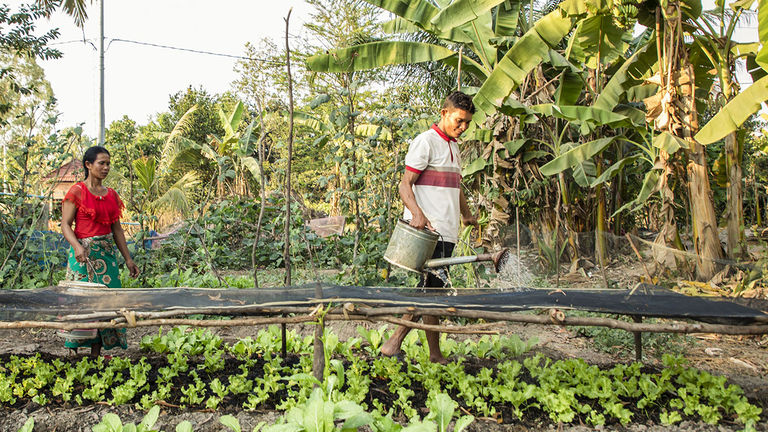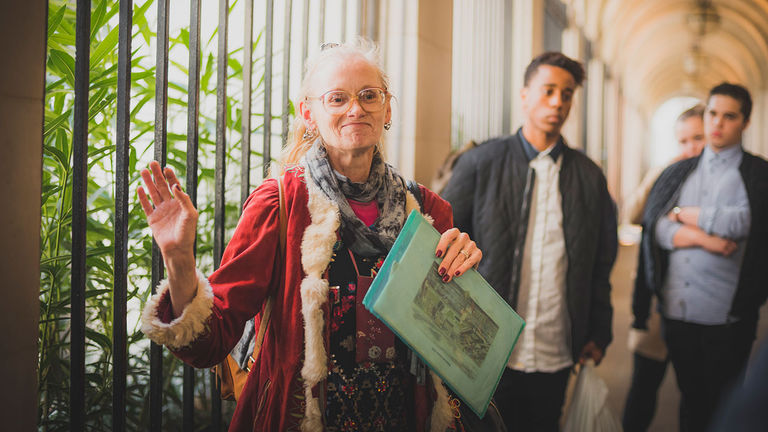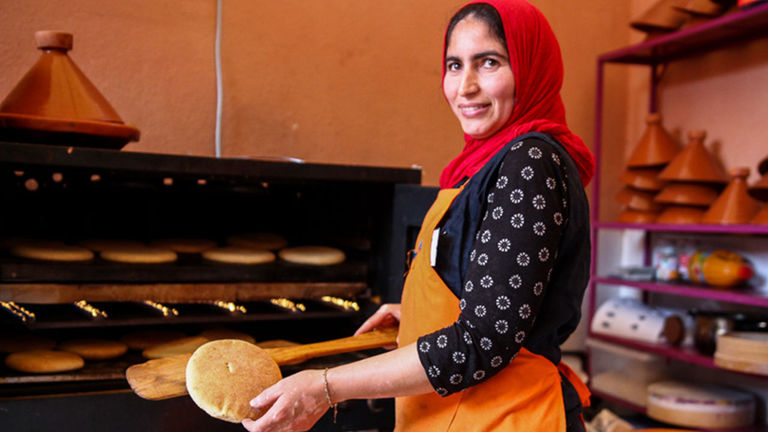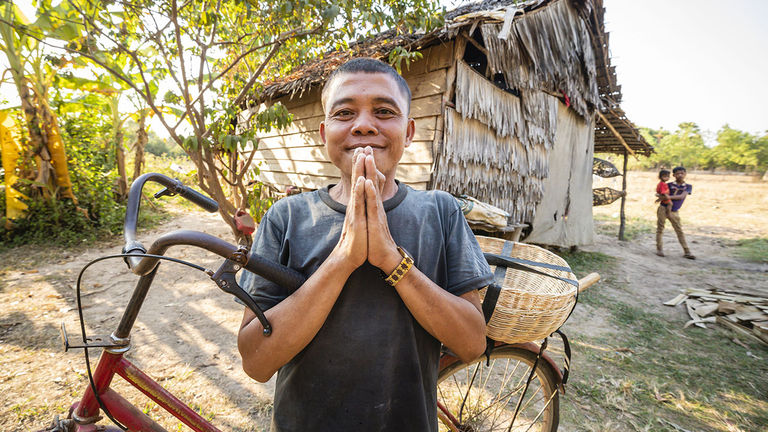Abercrombie & Kent (A&K) travelers visiting Cambodia’s legendary Angkor Wat also often make a later stop in nearby villages, where the tour operator has helped provide water wells for many impoverished local families.
“Despite having all that tourism, the Siem Reap district where Angkor Wat is located is still the second-poorest district in all of Cambodia,” explained Keith Sproule, executive director of Abercrombie & Kent Philanthropy. “And access to water remains a critical concern.”
For about $450, the operator’s philanthropic arm is able to get a drilling rig to a Cambodian family’s home, dig a 65- to 100-foot well, lay a concrete base and install PVC piping, a UNICEF-recommended hand pump and a bio-sand filter, according to Sproule. A&K has delivered between 200 and 275 of these wells this year to Siem Reap families, Sproule said, noting his organization partnered with Cambodia’s Ministry of Rural Development to find families in need.
 Abercrombie & Kent Philanthropy has provided hundreds of Cambodian families with access to clean water.
Abercrombie & Kent Philanthropy has provided hundreds of Cambodian families with access to clean water.
Credit: 2021 Abercrombie & Kent Philanthropy
“Our guests will understand immediately when they visit that family, the value of a woman having access to clean water for health and hygiene and washing clothes, and for the husband to have access to water for irrigation purposes,” Sproule said. “That understanding — we could never convey it except through the experience.”
Firsthand Awareness
A&K is just one of many tour operators providing their customers with authentic experiences across a range of different global destinations, allowing travelers to not only connect with people living in the places they visit but to better understand their daily lives and cultures. And perhaps more importantly, many of these encounters offer these tour operators’ clients a chance to spend their vacation dollars on community-focused and sustainable tourism products.
Travelers on a Collette tour in Morocco can, for example, take a cooking class in Marrakech at the Amal Center, a nonprofit focused on empowering disadvantaged women through restaurant training and job placement.
“By going there and doing the cooking class, having a great time, picking herbs, making a meal together and then eating it, the guests are having this great experience that you might not see on another tour,” explained John Sutherland, Collette’s director of corporate social responsibility. “But you’re also directly helping out the women in the community and their families.”
Folks traveling with G Adventures in Kandy, Sri Lanka, are likely to visit the Sthree Craft Shop and Cafe, a nonprofit organization featuring handicrafts made by more than 100 local women artisans. Planeterra, a nonprofit launched by G Adventures founder Bruce Poon Tip in 2003, granted the Sthree Craft Shop $30,000 in 2017 to build a kitchen and, soon after, helped bring travelers to the cafe. Business has been booming at the shop and cafe ever since, according to Rhea Simms, Planeterra’s senior global programs manager.
And now, profits from this organization actually go into supporting a shelter for women who have been abused, so the ripple effects could go really far.
“We built a kitchen in a room that was just completely dilapidated and helped them get the training they needed to manage this new tourism enterprise,” Simms said. “Then we linked them to thousands of travelers. Within six months, their profits had quadrupled. Suddenly, their confidence is growing, and they could support more artisans and entrepreneurs. And now, profits from this organization actually go into supporting a shelter for women who have been abused, so the ripple effects could go really far.”
London visitors traveling with one of The Travel Corporation’s (TTC) collection of brands can join a walking tour of the city led by a former homeless individual or someone who is at that moment currently struggling with housing. Called Unseen London, proceeds from the tour paid by TTC’s clients go to the individual leading the tour, according to Shannon Guihan, the company’s chief TreadRight and sustainability officer.
TTC has qualified nearly 500 of what it’s now calling Make Travel Matter Experiences, Guihan said, noting all of them adhere to a framework of United Nations sustainable development goals. And at least one Make Travel Matter experience will be available on all the itineraries across TTC’s brands by 2023.
 Guides with housing struggles lead Unseen London tours.
Guides with housing struggles lead Unseen London tours.
Credit: 2021 Unseen London“There is a great number of really well-meaning, interesting, educational travel opportunities and organizations out there that we are integrating into our itineraries in a way that benefits them,” Guihan said. “They start to see regular revenue — notwithstanding COVID-19 — in a way that enhances the experience we’re able to provide to our guests, who are able to really get to know a place and its people.”
Heavy Uplifters
Collette’s Sutherland was quick to note, meanwhile, that the tour operator is still committed to ensuring its clients engage with all the sought-after visitor attractions when joining one of the company’s tours to an in-demand destination. But the goal is also to offer clients a deeper understanding of a place by working directly with local community organizations, such as the Amal Center in Marrakech, while providing the destination residents a more active role in how visitors experience tourism in their homelands.
 Collette works with the Amal Center in Morocco.
Collette works with the Amal Center in Morocco.
Credit: 2021 Amal Center“We’ve certainly seen in the past, or at least before COVID-19, that communities in certain places in the world were starting to push back against the travel industry,” Sutherland said. “You are not going to have a successful travel industry in places where the community doesn’t want to welcome people in. The way the industry as a whole deals with that is by taking the lead from the destinations and the local communities in terms of what it is they want.”
Although it works regularly today with G Adventures and receives corporate donations from the tour operator, Planeterra remains a separate entity, according to Simms, who said the nonprofit is dedicated to helping tourism organizations reinvest their profits into their communities, focusing on areas such as combating climate change, working to end poverty or providing accessible local healthcare.
“Really what we’re doing is trying to uplift communities, which can in turn uplift the tourism industry as a whole and make it something that is very much for the people — better hosting by the people that are hosting and authentic to what the communities want to show you, as well as how they want to bring tourism and showcase tourism in their location,” she said.
You are not going to have a successful travel industry in places where the community doesn’t want to welcome people in. The way the industry as a whole deals with that is by taking the lead from the destinations and the local communities in terms of what it is they want.
According to a Booking.com online survey conducted in March this year, 61% of the 29,000 international travelers polled said the pandemic has made them to want to travel more sustainably in the future. Those survey results didn’t come as a surprise to A&K’s Sproule, who said he’s had more inquiries from travel advisors about the company’s sustainability efforts over the past few months than in his previous six years at the company.
“Folks have been at home, watching the Travel Channel and imagining all these places they want to go, but now they want to travel more consciously, and they’re a little bit more aware of the inequity of things,” Sproule said.
“They understand these communities in particular are still suffering from COVID-19, from the Delta variant, from the lack of vaccines, and I think they had pause to reflect on what’s really important.”
The March Booking.com survey also indicated travelers are concerned about the communities they visit, with 84% of those polled saying they believe increasing cultural understanding and the preservation of cultural heritage is crucial, while 76% said they want to ensure the economic impact of the tourism industry is spread equally in all levels of society.
Sproule said tour operators that don’t have a clear and concrete answer for what they’re doing as a business to improve sustainability within the tourism industry “are really behind the times.”
 A&K visits homes in Siem Reap where water pumps have been installed.
A&K visits homes in Siem Reap where water pumps have been installed.
Credit: 2021 Abercrombie & KentTTC’s Guihan agreed, noting her company feels sustainability is mandatory in order to maintain a strong and resilient tourism industry.
“There are still a lot of operators that are not quite convinced yet about the value of sustainability,” Guihan said. “Tourism is an interesting industry because we all share access to destinations. The health, safety and well-being of the destination means a fabulous travel experience. Not prioritizing that is putting the traveler’s experience and their hopes and dreams and bucket lists at risk. More importantly, it’s putting communities and destinations that we are privileged to explore at risk.”
Positive Neutrals and Setting Up Offsets
In September, the Globus Family of Brands announced a new partnership between Trees4Travel, an organization aiming for B-Corp status that plants trees for customers looking to offset the carbon emissions of their travel.
Globus’ Avalon Waterways will offset the carbon footprint of every one of its guests’ cruise experiences in 2022 by donating tens of thousands of trees to Trees4Travel, according to Steve Born, chief marketing officer at Globus.
We’re not offsetting and then saying, ‘Great. We’ve done our part.’ We’re offsetting until we no longer have to, which we really hope is not long.
“When you book with Avalon, at no additional cost to your booking, through Trees4Travel, we will offset the carbon emissions from your cruise,” Born said. “Really, this was a way we felt we can help make the idea of carbon offsets easy and more attainable and not out of pocket for our clients.”
Globus Family of Brands is also working with Trees4Travel to offset office facility emissions and staff travel, according to Born, who noted Avalon Waterways is aiming to launch the first fully electric river cruise vessel by 2027.
And TTC hopes to secure 50% of its energy through renewable sources by 2025 and has announced a goal to be carbon neutral by 2030, according to Guihan, who said the company’s Toronto office already runs on geothermal energy and its Sydney office will soon run solely on solar power. TTC also works with carbon offset companies who plant trees and others who make use of sea kelp in farming, Guihan said.
“It’s certainly not enough yet,” she conceded. “Carbon offsets are an interim solution for us. That’s important to note. We’re not offsetting and then saying, ‘Great. We’ve done our part.’ We’re offsetting until we no longer have to, which we really hope is not long.”